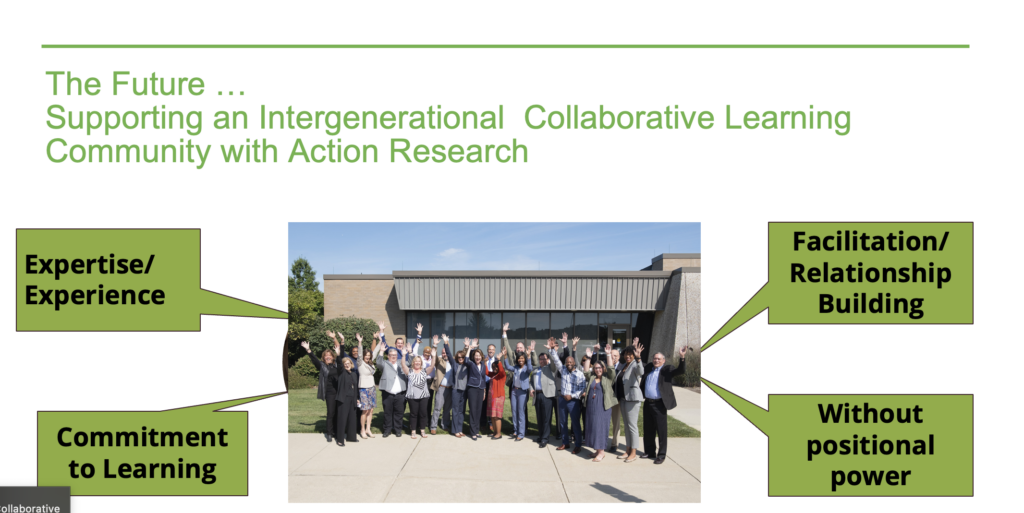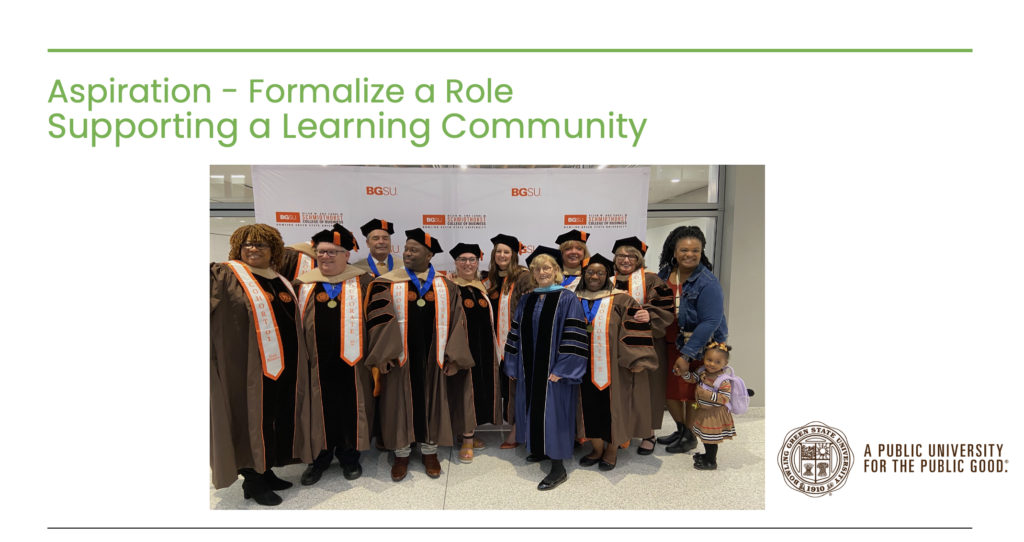Supporting Intergenerational ART: Workshopping with Dr. Carol Gorelick

On October 31st 2023, our AR+ coLAB centered the inquiry of Carol Gorelick in her work on and passion for Supporting the Next Generation of Action Researchers. Carols’s opening presentation on Intergenerational Learning About Action Research is at this link: https://vimeo.com/manage/videos/879741917
The vision is of more higher education programs producing more people with capacity for more impact, more grounded in the practice of Action – Research – Reflection and Continuous Feedback.
Carol identifies a persistent problem in university programs in that the reigning generation of professors – in the academy and professional schools – seem to have a different understanding of what’s needed than does a new generation of early career researchers. This issue of differing generational needs, relevant to higher education is also apparent in many spaces in society in general, e.g., politics.
The expertise Carol draws on in combining rigor and relevance, originates in working within a web of three types of knowledge constituents: business / organizational needs, organizational consultants and organizational researchers together. These dovetail with the three spaces of AR+: relational, conceptual and experimental spaces.
Carol’s professional and educational background includes many years in IT and its world of programmers who needed a “middle-person” between technology and end users. This was followed by a wonderful experience with an education project between (a school?) in So Africa and Detroit. Currently Carol is an ‘action-ethnographer’ in a new PhD program at Bowling Green State, known for openness for action oriented.
INQUIRY: What’s needed, institutional support Action researchers. Specifically, Carol sees a need to experiment with this program (and others) in providing an ART partner/mentor esp. for professional students after their course work
Salience: The attrition rate in PhD programs hovers around 50%…Is this a waste of human potential?! What’s happening here? What stops these students who started out so well? How do we to get them through?
Solution to consider: Providing a partner-mentor/weaver to action researching students.
The mentor-weaver provides subject matter expertise with commitment to facilitation and collaboration skills within a non grading role.
DIALOGUE among ARTists present:
- A key question to notice: which worldview am I coming from and with what kind of worldview am I engaging? A participative worldview (more likely among action researchers) makes this need for mentoring and weaving obvious. But a Modernist/expert worldview (with delusions of certainty that predominate in universities) cancels that…
- A big practical, backdrop question may be how to encourage more students to want and demand more Action oriented research opportunities…
- Knowing you’ll be mentored would make it easier for action researching students…
- Noticing Carol’s previous experience is with weaving across constituencies. A rich eco-system of learning emerges. Can we enable learning in both directions, between professors and students?
- Creating and naming the role of the weaver – an archetype- acknowledges the need for weaving, and makes it tangible. How important this role is!! (In an inherited era of fragmentation)
- Andrea gives an example of a team in Burundi, who saw the need for a role for weaving across differences. And so they named the role to formalize it…but then it got boxed into already known structures!
- But does it have to be a formal role inside a structure. Let’s be curious about where its happening organically.
- The academy is its own action research project! Regenerative organizing-relates to other coLABs – is needed inside the academy.
- What are the spaces for this mentorship – architecturally too (some physical spaces allow and some hinder even sitting together informally!)
- Accessibility of knowledge and information beyond the academy is also key (paywalls etc)
- The “heart vs. rigor” polarity is usually pitted against arguments in favor of innovating in academia.
- The old way is “sink or swim.” Is this a developmentally speaking an example of “Expert mind” which is either/or search for a correct answer with little appreciation for the importance of relational space.
- Peer to peer learning is very (as) important…people encouraged to weave their own nets.
Conceptualization
- Underneath any action to make the academy different lies our theory of change…intervene in values vs structure etc. So key to how we dig into the system we’re in, is working with what is already there. Moreover noticing and talking to different integral quadrants – worldview/role/practice.
- Geoff Scott in Australia gives a simple (after complex) suggestion: Listen, Link, Leverage (Lead). See more at Geoff Scott: https://www.westernsydney.edu.au/staff_profiles/uws_profiles/emeritus_professor_geoffrey_scott l
- Reading suggestion: Women looking at men looking at women by Siri Hustvedt! -She addresses some of these issues brilliantly.
Hopeful Examples/experiments
- Patricia Canto offers an example from her own PhD program director who was not grading. The mentor made a regular space for students to sit down with others to talk about challenges … she was “accompanying” students. She both wanted to do this and her hours were rewarded. In turn Patricia’s case (last time of Zubigintza)…was about working with a shared concept of weaving (vs. sandwiching!) Currently P’s hours are rewarded to document and reflect…without reward there is exhaustion. But it’s loosely defined how to use these hours
- Hilary is going to a conference on the topic of how the academy can (and should) turn to the planetary crisis. The organizers are very supportive of action research. It’s in Ireland where there is also an upcoming citizens assembly on the future of education. (PS it was a terrific and surprisingly oprimistic conference…lots of good energy, lots of being sick and tired with how it’s been and willingness to step up/over the formal leadership. If not now, then when!
- Ruth reminded us that the government’s “Stiftung des Deutschen Volkes” offeres a model of sorts for over 20 years, at each university. PhD students meet. It’s limited to a special group of students who get grants. Who (together) can offer likewise to ART students?
Thus, a mix of personal will and structural conditions…having the hours/money is a basic requirement, but after that it’s an interaction of will and structure
Carol’s initial response to all this: https://vimeo.com/879740565?share=copy#t=0
- I appreciated the probing and pushing to be more clear in the specific innovation I am asking for. That’s valuable.
- I’m now asking, are there alternatives to how I’m thinking? In one way it was too easy – these are the characteristics and here’s what’s needed
- The resistance is to any kind of innovation is also real!
- I can use the ethnographic notes I have gathered to begin to write
- Maybe AR+ can host a coLAB on this very topic. TBD!
HARVESTING / checking out with Andrea
Q: What patterns and links are we seeing from previous discussions on enabling transformative learning spaces. Note: We’ll also be talking about this (and other) coLABs at our upcoming Gathering in Italy!
- The Old world is dying and new world is being born…it’s painful everywhere. Also a time for innovation.
- Notice how everyone’s topic is part of every other’s topic…weaving (developmental friendship).
- Inoculation can inspire us… i.e., we can inoculate with tiny/ homeopathic doses rather than make huge changes. All the while we’re holding the paradox and the power of really deeply caring together.
- The future of higher education/adult learning is a big topic! We can say we are each inoculating and it will add up
- Curiosity more generally about doing things in new ways. This “unfreezing” is happening all over. There is fragility we feel with not being the expert and letting things move toward flow – this is so present in so many spaces.
- Is there in developmental friendship something about letting things go/drop when it is timely
Final words
“To everything there is a season, turn, turn, turn.” Feeling a lot into the old world dying and a desire to both curl up AND a need / calling to do this work of transformation, making sanctuary with one another. I leave touched by the links among us and our projects…
I leave with hope for new/next generations in the old world dying and a new one being born

- Three stories we did not tell about NGO-Community Collaboration in Uganda - April 18, 2024
- Podcast on PAR Peacebuilding in Colombia - April 15, 2024
- Julian Hauer’s Workshop– thinking wider and deeper - April 15, 2024
